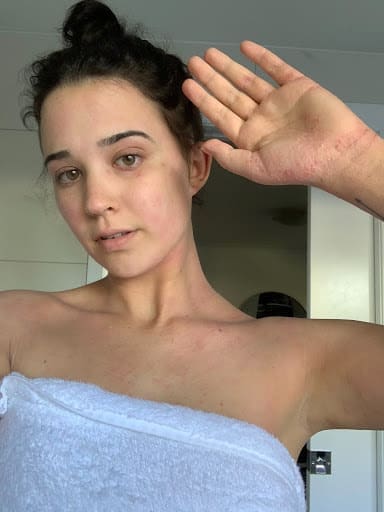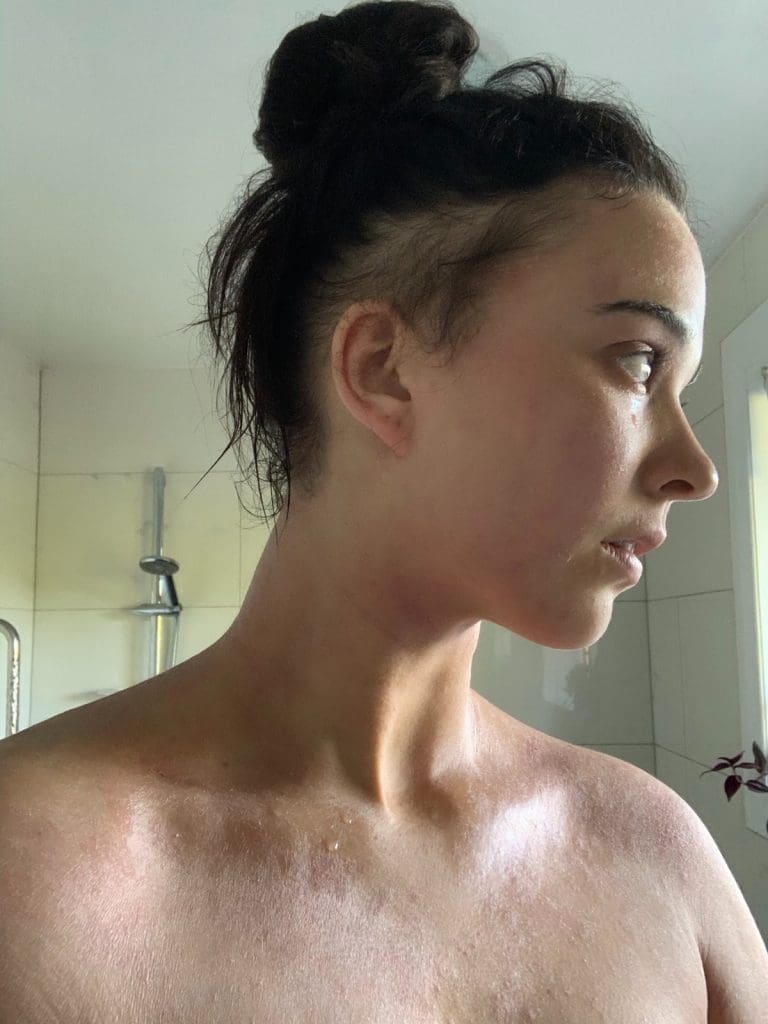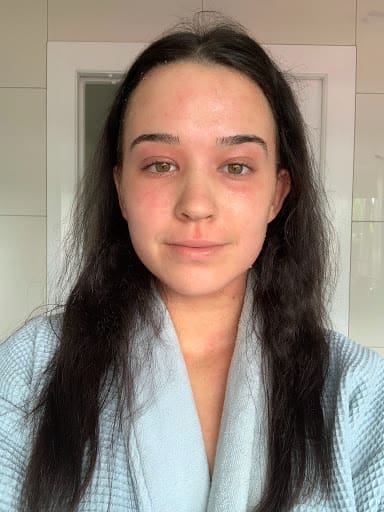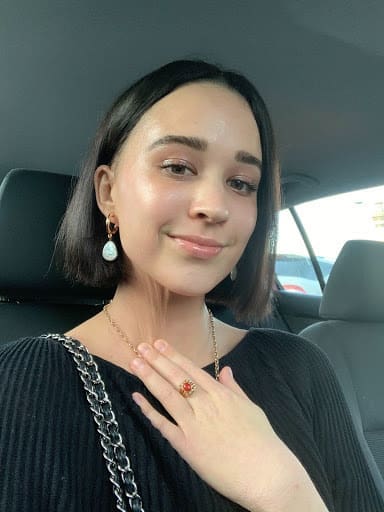The work hard/play hard pattern of your early twenties, and the ‘hustle, hustle’ culture of our current work environment, means that for many young women entering the workplace, there’s an expectation that health is something you should be prepared to leave on the back burner while making your way up an (often unrewarding) career ladder. Here, Julianna Permitin talks about how burnout cost her a year off her life and why she wants other young women to be aware of what burnout culture can do to your body.
Growing up with mild eczema after being diagnosed as a toddler, one of the drawbacks that Julianna remembers the most is that her mum wouldn’t let her have chocolate. As a kid, that’s a pretty memorable detail.
When she was growing up, eczema meant avoiding minor triggers so that Julianna wouldn’t get patches of the skin condition in the creases of her arm. So far, so tolerable. But it was when she started university and the first wave of adult stress approached that the symptoms ramped up: eczema patches behind her knees, behind her ears and on her hands.
Her GP was keeping close tabs on it and Julianna was assured she would most likely grow out of it. But upon leaving university and entering the workplace that another, stronger wave of adult stress hit. In a demanding high profile job with long hours, combined with the 20s-hustle of ‘work hard, play hard’, things took a turn.
“My hands, legs and neck began to slowly grow this aggressive, painful rash. I had always been the girl with the ‘big career’, so I thought it was stress related and that I should just put up with it,” Julianna says. “Mentally and emotionally I was in absolute fight mode. I developed an addiction to my anxiety – if I was feeling anxious it meant I wasn’t working hard enough.”
Stress took the all-too-common turn into burnout. “Burnout, to me, is waking up to your alarm and having that overwhelming tsunami wave of a list you have to check off for the day. You’re suffocating with anxiety at the thought of stepping into the office,” Julianna says. “It was beyond just ‘having a bad week’ – you can’t see the light.”
“That’s when I began to hate the term ‘girl boss’, because it shows the idea that you cannot and shouldn’t rest to be successful – you need to work overtime every single day, always be the ‘yes’ girl’. ‘I can sleep when I’m dead’, I used to say.”
Julianna’s partner at the time was a primary school teacher – itself a high demand, responsible career path. It was he who started to point out how unhealthy Julianna’s situation was and how her relationship with her job was taking away her health. The physical symptoms only continued getting stronger.





By this stage, the so-called eczema was so vicious that Julianna had been on topical steroid creams for four months – and then they stopped working. “My GP passed me onto a dermatologist, who apologised and said there was no cure. When a specialist says that to your half-peeling, half-scratched face… you believe them.” A possible treatment of steroid injections came with the risk of potential infertility. “I bawled my eyes in the car… having to come to terms with this in my early twenties was simply devastating.”
Julianna had also been told that dietary changes wouldn’t make a difference to her eczema but by this stage, it was so life-damaging she was hiding her hands whenever possible – her skin so harsh to look at and sensitive to daylight and fabric. At the beginning of 2020, Julianna decided to give up the steroids to see what happened, after noticing she was starting to lose her hair and eyebrows. However, giving it up cold turkey meant she then started to go through withdrawal.
“I started to find bright red burn patches on my skin, which then spread across my body. I remember waking up one summer morning and the sheets were filled with dead skin, my ‘burn’ was shedding? I walked to the mirror to see that my entire back – from the top of my neck to the bottom of my feet – was peeling off.”
There were some mornings she had to use her hands to open up her eyelids upon waking, as they had become glued together in the night; this was on top of experiencing insomnia. When she cried, the tears would burn her skin. “I felt like I was no longer human.”






While mainstream medicine is incredible – and life-saving – for numerous illnesses, there are certain conditions that can be easy to diagnose but a confusing mine-field when it comes to treatment. So Julianna tried the holistic route, using some of her OE savings to make an appointment with a naturopath who diagnosed the triggers, it was no longer eczema but an unnamed chronic illness, the symptoms including leaky gut, food intolerances and stress-affected mental health issues.
“That was the hardest part to change, because it meant having to come to terms that I needed to leave my job and find something new. I felt as though I was definitely sinking, rather than swimming, in a fast-paced industry.”
The naturopath recommended an autoimmune paleo diet as well as looking at ways to calm her stressed-out system. At this stage showering was too painful on her cracked skin, so Julianna’s lovely partner Joel became her caregiver, running her chamomile baths every night. He would sit next to her and read to her while she cried. Eventually, she stopped being able to sleep at night for more than three hours at a time because the pressure from the bedsheets would be agonising on her skin. Her hair continued to fall out and her skin had become so fragile that it would break into open wounds, day in, day out.
But slowly, slowly, the lifestyle changes started working. Julianna changed jobs and found a more balanced workplace. She started sleeping better and her skin started healing. Just over a year since she hit rock bottom, she’s now left with a couple of patches that aren’t gone forever; they’ll continue to act as small reminders to slow down when life gets hectic again.
When Julianna decided to share her story and her photos, it was to help other people going through it that it won’t last forever. “’This too, shall pass,’” she says. “With illnesses like this, don’t live in the past or in the future. Today, you are in the battlefield… find one thing that is pain-free, carefree and relaxing.
“I was never someone who ‘found Zen’ before all of this, but I learned to take daily baths, cracking that ‘rainforest rain’ playlist, and I also took breathing yoga workshops.” She also says finding a support system that loves you when you’re at your lowest is key. “when you’re sick, it’s so easy to push people away and hide. I pushed 90% of my closest friends away. I’ve lost a few of them even being healed. You need a small circle of people who will prioritise your illness like they do the moments when you’re a ‘fun Julianna’ and aim to understand it as best they can.”


“Your illness doesn’t define you and one day, you will wake up and realise you are the best version of yourself, coming out of it. I used to laugh at people when they’d say ‘stop and smell the roses,’ but, my goodness, I am smelling my backyard garden like I just got my senses back!”
+ For any concerns about your help, please, always consult your GP or medical professional.
Burnout is now such a global problem, it’s been added to the World Health Organisations ‘International Classification of Diseases’ diagnostic manual, with the description referring to it as “a syndrome conceptualised as resulting from chronic workplace stress that has not been successfully managed.”
With all that’s going on – pandemic, wars, general work/life chaos – burnout has become a topic so many of us are hearing about. But what is burnout, and who is at risk of it?
Capsule has profiled many experts on this topic and the various aspects of burnout. For instance, that you are more at risk of burnout if you love your job, which might seem like a surprising twist! We’ve also spoken to experts about how the pandemic has affected our overall mental health, as well as had employees share their candid, honest accounts of what burning out in a high-pressure job felt like.
If you’ve been through burnout, we’ve got tips on how to rebuild your life and manage your overall health. If you think your panic zone has become your comfort zone, we’ve got ways to help with that as well.
By arming ourselves with the facts, we can protect our mental health and prioritise our own wellbeing. As one expert says, ‘Wellbeing first. Work second. Every time.’

